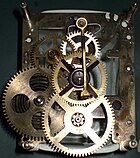
Back لاتوافقية Arabic Inkompatibilisme Danish Inkompatibilismus German Neakordigeblismo Esperanto Incompatibilismo Spanish ناسازگارگرایی Persian Inkompatibilismi Finnish Incompatibilisme French Incompatibilismo Italian Inkompatybilizm Polish
This article may contain improper use of non-free material. (August 2023) |

Incompatibilism is the view that the thesis of determinism is logically incompatible with the classical thesis of free will. The term was coined in the 1960s, most likely by philosopher Keith Lehrer.[1][2] The term compatibilism was coined (also by Lehrer) to name the view that the classical free will thesis is logically compatible with determinism, i.e. it is possible for an ordinary human to exercise free will (the freedom-relevant ability to do otherwise), even in a universe where determinism is true. These terms were originally coined for use within a research paradigm that was dominant among academics during the so-called "classical period" from the 1960s to 1980s,[3] or what has been called the "classical analytic paradigm".[4] Within the classical analytic paradigm, the problem of free will and determinism was understood as a compatibility question: "Is it possible for an ordinary human to exercise free will (classically defined as an ability to otherwise) when determinism is true?"[5] Those working in the classical analytic paradigm who answered "no" were incompatibilists in the original, classical-analytic sense of the term, now commonly called classical incompatibilists; they proposed that determinism precludes free will because it precludes the ability to do otherwise. Those who answered "yes" were compatibilists in the original sense of the term, now commonly called classical compatibilists.[6] Given that classical free will theorists (i.e. those working in the classical analytic paradigm) agreed that it is at least metaphysically possible for an ordinary human to exercise free will,[7][8] all classical compatibilists accepted a compossibilist account of free will (i.e. a compossibilist interpretation of the ability to do otherwise) and all classical incompatibilists accepted a libertarian (a.k.a. libertarianist) account of free will (i.e. a libertarian/libertarianist interpretation of the ability to do otherwise).
The classical analytic paradigm has fallen out of favor over the last few decades, largely because philosophers no longer agree that free will is equivalent to some kind of ability to do otherwise;[9] many hold that it is, instead, a type of sourcehood that does not require an ability to do otherwise.[10] The number of philosophers who reject the classical assumption of anthropocentric possibilism, i.e. the view that it is at least metaphysically possible for a human to exercise free will, has also risen in recent years.[11][12] As philosophers adjusted Lehrer's original (classical) definitions of the terms incompatibilism and compatibilism to reflect their own perspectives on the location of the purported "fundamental divide" among free will theorists, the terms incompatibilism and compatibilism have been given a variety of new meanings. At present, then, there is no standard meaning of the term incompatibilism (or its complement compatibilism).
- ^ van Inwagen, Peter, 'The Problem of Fr** W*ll', in Hugh J. McCann (ed.), Free Will and Classical Theism: The Significance of Freedom in Perfect Being Theology (New York, 2017; online edn, Oxford Academic, 22 Dec. 2016), https://doi.org/10.1093/acprof:oso/9780190611200.003.0001, accessed 20 Aug. 2023. Open-access article available at: https://andrewmbailey.com/pvi/
- ^ Lehrer, Keith Edward (1960). Ifs, Cans, and Causes. Brown University ProQuest Dissertations Publishing, 1960. 6205755.
- ^ van Inwagen, Peter, 'The Problem of Fr** W*ll', in Hugh J. McCann (ed.), Free Will and Classical Theism: The Significance of Freedom in Perfect Being Theology (New York, 2017; online edn, Oxford Academic, 22 Dec. 2016). Open-access copy available at: https://andrewmbailey.com/pvi/
- ^ Mickelson, Kristin, Joe Campbell, and V. Alan White, "Introduction," in A Companion to Free Will (Campbell, Joe; Mickelson, Kristin M. & White, V. Alan (eds.) (2023). Wiley-Blackwell:1-19. Available open-access at https://philarchive.org/rec/CAMWCT-2
- ^ Peter van Inwagen - Big Questions in Free Will, retrieved 2023-08-22
- ^ Daniel Dennett - What is Free Will?, retrieved 2023-08-22
- ^ Van Inwagen, Peter (1983). An Essay on Free Will. New York: Oxford University Press.
- ^ Vihvelin, Kadri (2013). Causes, Laws, and Free Will: Why Determinism Doesn't Matter. New York, NY, USA: Oup Usa.
- ^ Frankfurt, Harry G., 1969, "Alternate Possibilities and Moral Responsibility", The Journal of Philosophy, 66(23): 829–839. Reprinted in Fischer 1986, pp. 143–52; in Frankfurt 1988, pp. 1–10; and in Widerker and McKenna 2003, pp. 17–25. doi:10.2307/2023833
- ^ Pereboom, Derk (2001). Living Without Free Will. New York: Cambridge University Press.
- ^ "Free Will is Impossible. Interview with Derk Pe..." hardproblem.ru. Retrieved 2023-08-22.
- ^ "Hard Luck: How Luck Undermines Free Will and Moral Responsibility By Neil Levy". Free Unlimited Books PDF eBook or Kindle ePUB free. Retrieved 2023-08-22.
© MMXXIII Rich X Search. We shall prevail. All rights reserved. Rich X Search